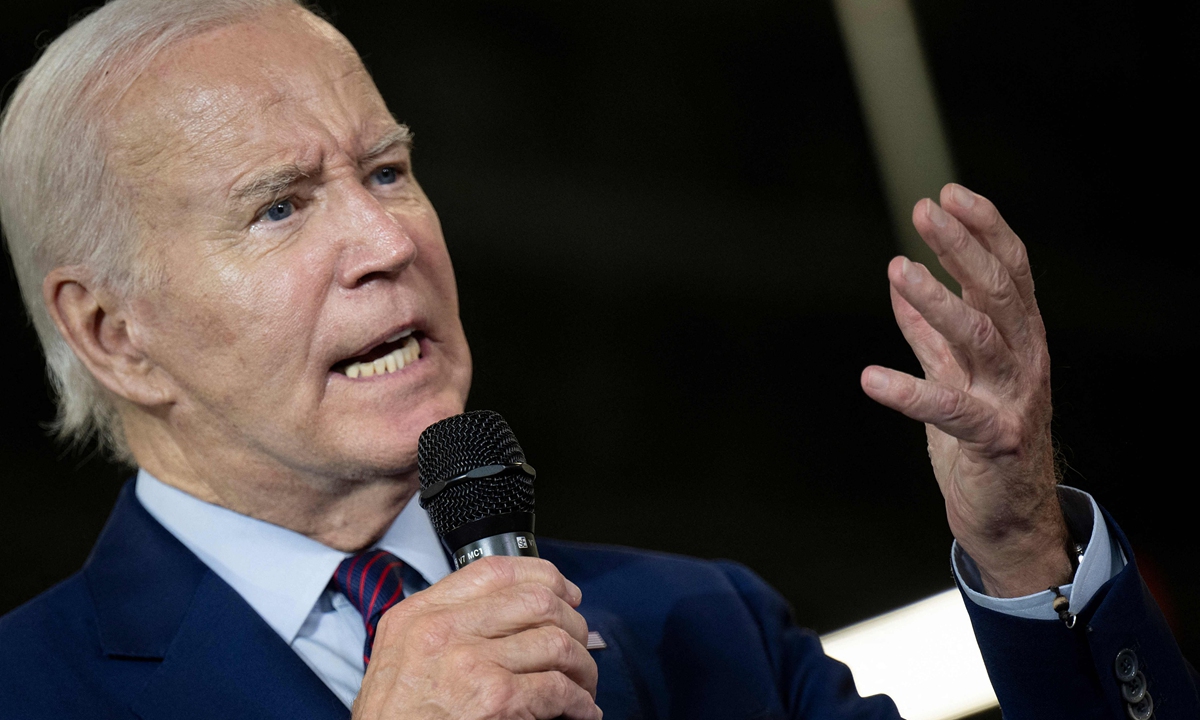
Photo: CFP
The Biden administration plans to issue an executive order restricting investment in "sensitive technologies" in China this week, the Nikkei Asia reported on Saturday.
The news, which came shortly before the US commerce secretary's reported China visit, is a flawed pressure tactic repeatedly used by the US but it will fail again, Chinese experts said.
As the US is intensifying technology blockade to contain China which is getting increasingly ineffective, the reported investment restriction is against economic norms that will trigger a stronger backlash from American corporate investors and dent Biden's re-election chance, experts said.
The executive order would restrict US investment in China in high-tech sectors such as AI, semiconductor chips and quantum computing, three people familiar with the matter told Nikkei Asia.
The investment restrictions, which have been postponed on several occasions and could be delayed again, are not expected to take effect right away, according to Reuters.
The news comes as Bloomberg reported that US Commerce Secretary Gina Raimondo is planning to visit China in late August.
The topic also came up last month during US Treasury Secretary Janet Yellen's meeting with Chinese officials, Reuters reported.
The recent series of visits by senior US officials to China is not simply a case of Washington's efforts to ease bilateral tensions, as some Western media reports claim, Gao Lingyun, an expert at the Chinese Academy of Social Sciences in Beijing, told the Global Times on Saturday.
The news, intentionally leaked in order to put pressure on China on the eve of meetings between Chinese and US officials, is a frequently used US political tactic to win a prior advantage, but the petty move won't force China to comply with arbitrary demands, Gao said.
Issuing a clumsy administrative order that goes against economic principles is another flawed move aimed at "decoupling and breaking industrial supply chains" and weaponizing economic and trade issues, experts said.
The plan to restrict investment in the technology sector obviously creates great uncertainty and risks for US corporate investors. If US President Joe Biden chooses to harm the interests of US companies in such a clumsy way using executive orders, his re-election prospects will suffer, Gao said.
In response to questions about the reported plan, Chinese Foreign Ministry spokesperson Mao Ning said earlier that China opposes the US politicizing and weaponizing trade and technology issues. It is in no one's interest to place arbitrary curbs on normal technology cooperation and trade, violate the principles of the market economy, and destabilize global industrial and supply chains.
If the US government keeps on suppressing and blocking China's technological development, the US will hurt both itself and others, and damage international trade and the global economy, said Dong Shaopeng, a senior research fellow at the Chongyang Institute for Financial Studies at the Renmin University of China.
US politicians are weaponizing economic and technological cooperation in an attempt to maintain its absolute technology hegemony. This will stir up a stronger backlash from the business community, both in the US and abroad, Dong said.
Tesla CEO Elon Musk said during his trip to China in May that the interests of the US and China are intertwined. Tesla opposes "decoupling" and is willing to continue to expand its business operations in China and share China's development opportunities.
Musk is just one of many US executives who have visited China this year. From Apple CEO Tim Cook and JPMorgan Chase CEO Jamie Dimon to Starbucks Global CEO Laxman Narasimhan, many US business executives have come to China to seek a larger slice of the huge market.
The US business community has released a clear signal that the Chinese market has brought great opportunities for US companies, and cooperation with China is in line with the US interests, experts said.




